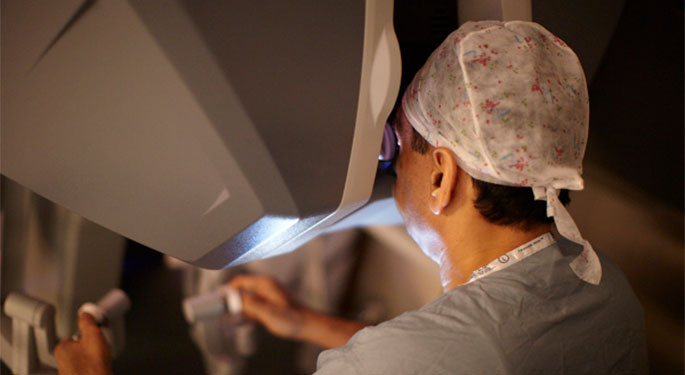Prostate Cancer Fusion Biopsy

Under the leadership of Ashutosh Tewari, MBBS, MCh, FRCS (Hon.), DSc (Hon.), Chair of the Department of Urology, and Ardeshir R. Rastinehad, DO, Director of Focal Therapy and Interventional Urologic Oncology, Mount Sinai offers a state-of-the-art test for when doctors suspect you may have prostate cancer: the fusion biopsy. This test combines magnetic resonance imaging (MRI) with real-time ultrasound images so physicians can precisely track, target, and sample the prostate tissue that appears to be suspicious. Using fusion biopsies often means that you will undergo fewer biopsies.
How It Works
We perform fusion biopsies in an outpatient setting under local anesthesia. The procedure takes a few minutes. Our team has significant experience with the Artemis and UroNav biopsy systems.
We start the two-step process by doing an MRI. The information is loaded from the MRI into software that produces a three-dimensional model of the prostate. Radiologists mark the spots that they are concerned about, calling them “targets.” We then transfer this information onto the fusion biopsy system for targeted biopsy.
This new approach opens the door to a possible treatment, called focal therapy. Using this specific targeting approach, we would be able to treat only the tumor treated without removing the entire prostate. We are currently conducting a clinical trial on this topic.
Development of the Approach
For three decades, urologists have diagnosed prostate cancer using prostate specific antigen (PSA) blood test and digital rectal exam (DRE) screening tools. If further testing is indicated, we perform a needle biopsy; we use 12 to 24 needles, delivered transrectally and guided by ultrasound. Unfortunately, needle biopsy has limitations; indeed, we sometimes refer to the procedure as “blind” because we have to choose at random the areas for testing. This means that we can miss some serious cancers and end up treating some non-threatening (indolent) tumors.
Mount Sinai is one of two centers in the country involved in the research and development of advancements of fusion biopsy technology using the UroNav system. Dr. Rastinehad is the first urological specialist to have performed a transperineal biopsy at Mount Sinai using Uro NAv (transperineal biopsies can reduce infections that are more likely to occur via a transrectal approach).